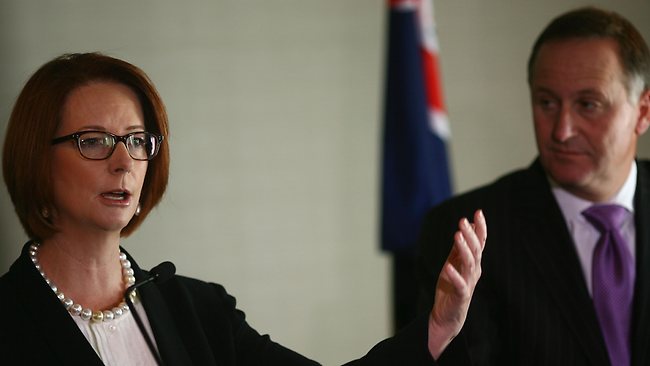Deal to drive down trans-Tasman mobile roaming sting
TRANS-TASMAN travellers hit with massive mobile phone bills are in for respite.
TOURISTS and business travellers who have been hit with massive mobile phone bills are in for respite with regulators to be given new powers to investigate the high cost of mobile roaming across the Tasman and to drive down prices.
Julia Gillard and her New Zealand counterpart, John Key, announced the move at their annual leaders' summit in Queenstown today.
To further deepen economic integration between the two countries, the two prime ministers also announced that Australia and New Zealand would streamline travel between the two countries through an $8 million trial of automated border processing technology for departures from Australian airports.
They would also drive help Australians and New Zealanders to consolidate retirement savings in their country of residence, and avoid paying fees and charges on accounts held in two countries through the commencement of new superannuation portability arrangements from 1 July 2013.
A new report into trans-Tasman telecommunications has found that the market is characterised by a small number of participants, with wholesale margins, on average, above 300 per cent and retail margins above 90 per cent.
Ms Gillard said the margins were well above the usual margins in the telecommunications sector of around 10 per cent to 20 per cent.
She said sending data could cost $20 per megabyte. One photo sent from a smartphone could cost almost $40. Phone calls could range between $2 and $8.50 per minute, with text messages around 75c each.
"The report clearly demonstrates the need for government action on roaming charges," Ms Gillard said.
"Consumers and businesses have had enough of being gouged and putting up with high mobile roaming charges."
The independent regulators in Australia and New Zealand would now be empowered to take coordinated action.
"The Australian Competition and Consumer Commission is currently unable to resolve the issue for Australian customers with its existing powers," Ms Gilllard said.
"We will both introduce legislation into the parliament that ensures that the regulators are able to investigate, and if necessary, take action to regulate prices.
"If the telecommunications providers act to bring down prices themselves, then of course action by the two regulators will not be required.
"This is just the tip of the iceberg. If we can drive down prices in New Zealand, we can also start to act to bring about lower prices in other advanced economies such as the European Union," Ms Gillard said.
This proposal would allow Australian and NZ businesses and consumers to use, at reasonable cost, their existing mobile devices and existing telephone numbers when visiting each other's country.



